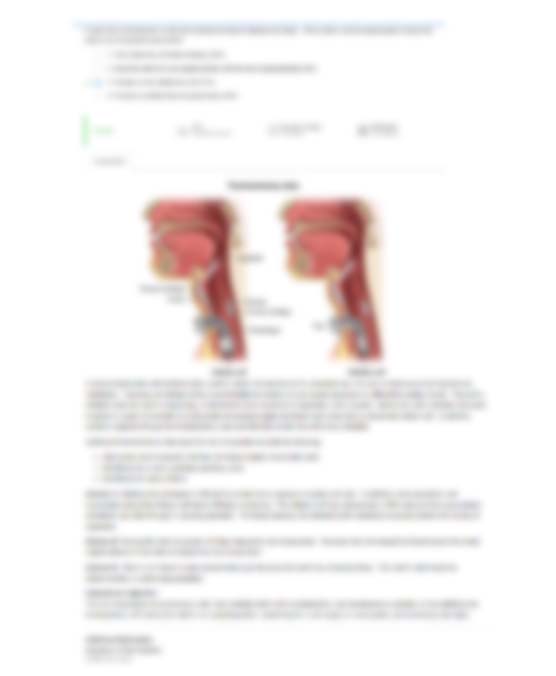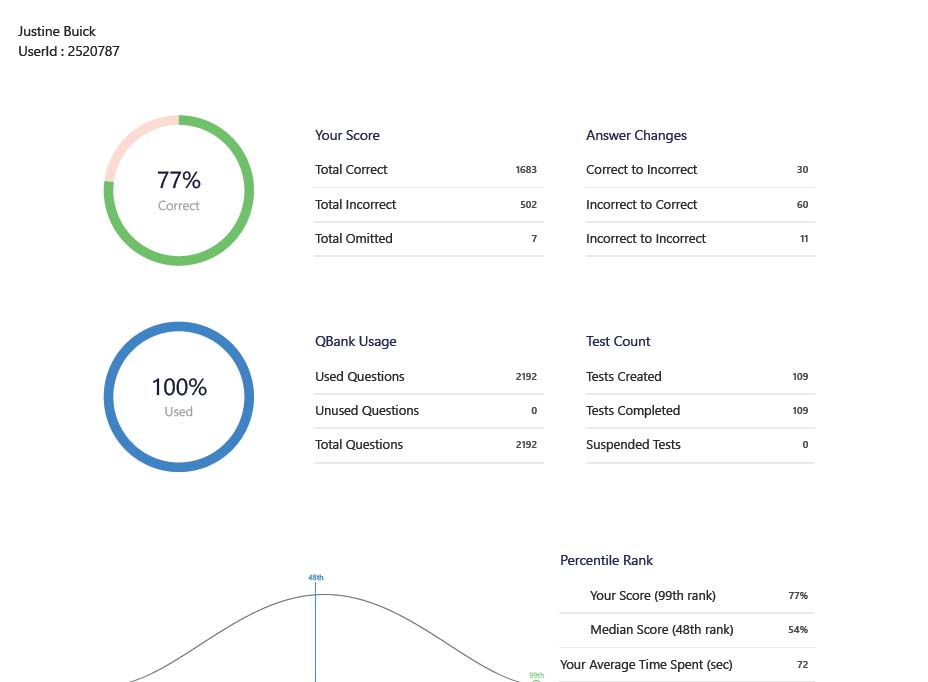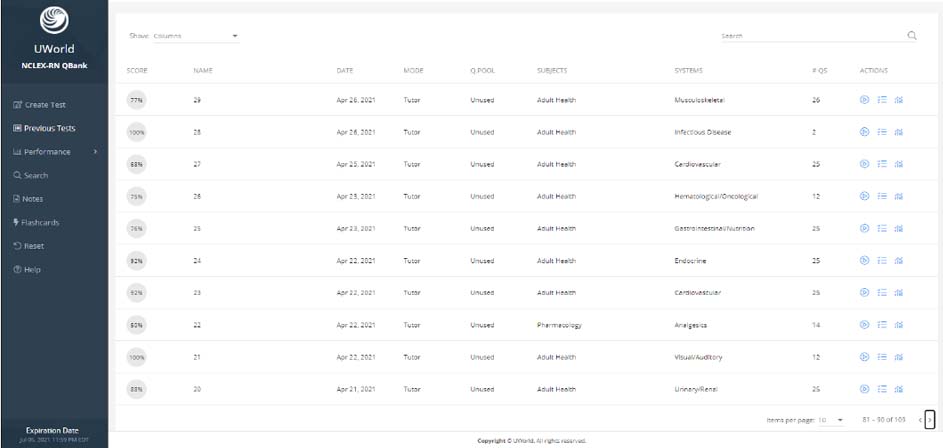Uworld NCLEX questions are a very popular resource to use for NCLEX prep. I did all the questions (~2200) in 3 months and ended up spending $284 for it! I wanted to find out if what I heard was true.

Are they really that hard?
Are they really that good?
Are they too medical?
Are the low scores normal?
Are the rationales awesome?
Are the rationales too much to read?
In this blog post, I go over the pros, cons, show you my scores and offer tips when doing Uworld NCLEX questions.
The Cons
1. The rationales can be too detailed a lot of the time. The rationales are what Uworld is known for. It can look impressive with all that content, but it was too much at times. There was information in there that didn’t really matter for the answer or wasn’t important to know as a nurse. I like rationales a little more to the point (but not bare like some resources I’ve seen). There could be a lot of wasted time reading rationales. However, you may like the longer rationales and that’s totally fine!

2. The answers can be too medical sounding. Some of the answers would be how a doctor would respond, not a nurse. For example, the correct answer would be explaining risks of a procedure. This can sound “scary” to a client and a nurse would not say this.
3. The questions were about obscure or rare diseases. The NCLEX people say that the test is about common and basic nursing content. So when Uworld is asking about something obscure, then it starts to sound more medical. I wondered if some of the medical questions were repurposed for nursing or maybe even medical students wrote some of the questions. For example, I’ve never heard of volmann contractures, sjorgens disease, diaylsis disequilibrium disorder or validation theory. And you’ve never heard of it either, because it’s rare and not worth remembering!
4. The answers are about things you’ve never heard of or are too detailed. It’s difficult to choose the answer if you’ve never heard of it before and it’s not something common or basic. Once again, this would be a very medical type of answer. This could be one of the reasons that Uworld may have such low scores.
The Pros
1. The questions are not too wordy. Students have told me multiple times that the questions were like reading a long paragraph and could be too complicated. I disagree – the questions were straight-forward and the problem was clearly stated. It could be that the questions look long because the rationales are so detailed.
2. It looks like the real NCLEX. This is important because being familiar with format of the real NCLEX decreases stress.
3. There are lots of SATA. Overall, the SATA were well-written. There are probably too many with all the answers correct. And some answers I disagree with. But as usual, not all questions are written perfectly or thoroughly tested for accuracy.
4. There are a lot of “Who do you see first?” questions. These are the multi-patient prioritization questions. It is a common type of question on the NCLEX and Uworld provides over a 100 of these types of questions and most are very well-written. Being able to pick out the immediate complication is an important skill.
5. There are lots of delegation questions. There are many poorly written delegation questions out there. However, Uworld did a good job writing these. There were surprisingly few that I disagreed with.
6. The pharmacology section is great. Uworld absolutely asks about the most common things to know about meds. And there wasn’t anything overly medical or detailed.
My Scores
Overall, I got 77% of my questions correct! I was in the 99th percentile for passing which is a very high chance for passing NCLEX. The median score was 48% so I was quite a bit higher (I expected to do well since I teach this stuff!). It’s important to know that scores are not the only indicator of passing. It’s VERY possible to get low scores (in the 50’s) and still pass NCLEX as long as you are reviewing basic content and understand that the test is based on SAFETY. So, content and choosing safe answers is key to passing.

My scores for the individual topics were:
- Adult health: 78%
- Child health: 74%
- Critical care: 78%
- Fundamentals: 76%
- Leadership/Management: 76%
- Maternity/Newborn: 72%
- Mental health: 79%
- Pharmacology: 80%
Here’s an example page from some tests I did and how I did the questions.
I always did my tests in sets of 25 because I have a short-ish attention span! I used study mode so I could read the rationale immediately after doing the question. I would then take a minute or two to rest and then start another test. If I got it right, I skipped the rationale. If I got it wrong, I would read the rationale. If I thought the content was important, and it wasn’t already in my nugget pages book, I would write it down. I never wrote down things that were rare or obscure.

You might be wondering why doesn’t Justine consistently get in the 80’s and 90’s?! Well, I try not to look up content before doing questions. But I will review content first. And because I teach this stuff, wrote a book and made flashcards, I should already know it. But I’m not going to know everything and even I forget some things! I also made some dumb mistakes when doing the questions, like missing key information or not really thinking about the answers enough. I hate when I do that! I also had so much nervous energy when I started Uworld that I did horrible on my first test of 25 questions and only got a 56% for Fundamentals: med administration! But I redeemed myself and did much better on test 3 the next day.

Uworld can ask about obscure or rare diseases. There’s just no way I’m always going to be able to get the right answer if I just don’t know what that thing is. I still haven’t looked up sjorgens disease or validation theory. 🙂
Can I Recommend Uworld?
Yes, absolutely! Uworld NCLEX questions are a solid set of questions to use with your NCLEX prep! Just make sure to review content before doing the questions. My students use my nugget pages book and flashcards.
There are other good resources out there such as: Hurst Review, Remar Review, Live Klimek Review or a book like Saunders. Just don’t use too many resources or you’ll get overwhelmed.
Why are there low average scores for Uworld?
In my opinion, the average scores for questions was way too low. After each question, you can see how many people choose the right answer(s). I thought that maybe students were 1) rushing through the questions and not really thinking about the answers or 2) didn’t study content before doing the questions and/or 3) there’s too much obscure/medical sounding questions and answers.
Whatever the reason for the low Uworld scores, it’s important to be thoughtful when doing the questions.
Tips
If you do decide to use Uworld, here are some tips.
1. Study content before doing practice questions. If you don’t know content, then it’s really hard to get the questions correct. So go review the topic first, then go do some questions. For example, if you are working on adult health cardiac, then go review cardiac first.
2. Do the fundamentals, critical care and priority questions last. These questions include content from all the systems and it’s important to have a good understanding of the content before attempting those.
The priority questions come from the leadership/management section and include all the “who do you see first” questions. These are questions where you have to choose the most immediate complication. You’ll want a thorough understanding of the immediate complications from all the systems.
3. Read the rationale if you get it wrong or don’t understand why you got it correct. Yes, there will be content in there that doesn’t matter, but it’s the only way to see why you got it wrong. If you get it correct and you understand why, then just skip the rationale.
4. Limit the number of questions to around 100 a day. Give yourself time to do the questions thoughtfully and don’t rush.
5. Add questions from another resource if the Uworld questions seem too hard. Remember that the real NCLEX asks about common and basic nursing stuff. You want to get the easy questions correct. I suggest the Saunders book to do questions because they ask about more common/basic things. Many other resources are fine to use also, such as Davis, or Lippincott.
My next NCLEX adventure is to do all the questions from the NCSBN review. This is a much cheaper option and many of my students have used it. Be on the look out for that REVIEW.